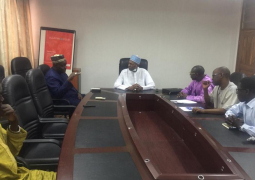
He made this statement while responding to questions from legislators of the National Assembly on Wednesday.
The minister highlighted that the government, through the Ministry of Agriculture, is modernising and commercialising agricultural production in rice, maize among other crops.
“The Ministry has the ROOT project, which is currently being implemented in 39 districts and all six agricultural regions, reaching 40,000 households and over 300,000 beneficiaries nationwide. This project is expected to help us attain our food self-sufficiency drive,” he explained.
“The project is to consolidate 1,300 hectares of existing tiger-irrigation schemes and develop 2,800 hectares of new irrigation schemes in existing agricultural lands in CRR; upgrade 20 kilometre ways to access 800 hectares of rice growing in swampy areas. It will develop 200 hectares of new webs of season value water control cascaded dives, establishment of about 1,300 hectares of mangrove and 1,400 hectares of community forest, and establish and strengthen water user management association.”
Mr Sabally said the project under the regional rice value chain would not only make the country food self- sufficient but also generate income for farmers, attract investment, increase commercialization of rice, reduce poverty and address the country’s rice deficit.
He urged producers to also focus on agro-processing and packaging. “Agribusiness is the component that is going to help us shift from producing only for consumption and can improve our market value as the rice value chain is heavily involved in it,” he said.
The minister pointed out that the National Development Plan 2023/27 and the continental investment plan – which is for rice self-sufficiency among other projects - are used to pursue and achieve a higher level of production and productivity, while enhancing higher levels of expansion and development of the food industry sub-sector.
He added that effective participation and representation of subsistence farmers among others will be achieved.





